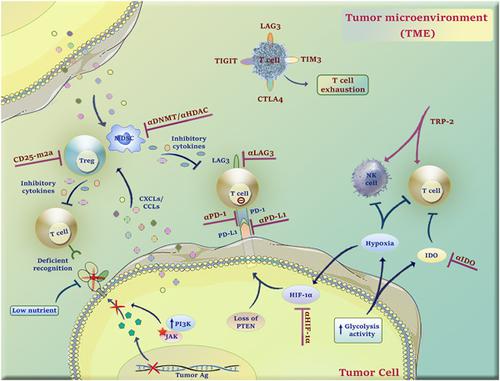当前位置:
X-MOL 学术
›
J. Cell. Physiol.
›
论文详情
Our official English website, www.x-mol.net, welcomes your
feedback! (Note: you will need to create a separate account there.)
Resistance to immunotherapy in human malignancies: Mechanisms, research progresses, challenges, and opportunities
Journal of Cellular Physiology ( IF 4.5 ) Pub Date : 2021-09-08 , DOI: 10.1002/jcp.30575 Davood Bashash 1 , Zahra Zandi 2 , Bahareh Kashani 2 , Atieh Pourbagheri-Sigaroodi 1 , Sina Salari 3 , Seyed H Ghaffari 2
Journal of Cellular Physiology ( IF 4.5 ) Pub Date : 2021-09-08 , DOI: 10.1002/jcp.30575 Davood Bashash 1 , Zahra Zandi 2 , Bahareh Kashani 2 , Atieh Pourbagheri-Sigaroodi 1 , Sina Salari 3 , Seyed H Ghaffari 2
Affiliation

|
Despite remarkable advances in different types of cancer therapies, an effective therapeutic strategy is still a major and significant challenge. One of the most promising approaches in this regard is immunotherapy, which takes advantage of the patients' immune system; however, the many mechanisms that cancerous cells harbor to extend their survival make it impossible to gain perfect eradication of tumors. The response rate to cancer immunotherapies, especially checkpoint inhibitors and adoptive T cell therapy, substantially differs in various cancer types with the highest rates in advanced melanoma and non-small cell lung cancer. Indeed, the lack of response in many tumors indicates primary resistance that can originate from either tumor cells (intrinsic) or tumor microenvironment (extrinsic). On the other hand, some tumors show an initial response to immunotherapy followed by relapse in few months (acquired resistance). Understanding the underlying molecular mechanisms of immunotherapy resistance makes it possible to develop effective strategies to overcome this hurdle and boost therapy outcomes. In this review, we take a look at immunotherapy strategies and go through a number of primary and acquired resistance mechanisms. Also, we present various ongoing methods to overcoming resistance and introduce some promising fields to improve the outcome of immunotherapy in patients affected with cancer.
中文翻译:

人类恶性肿瘤免疫治疗的耐药性:机制、研究进展、挑战和机遇
尽管不同类型的癌症疗法取得了显着进展,但有效的治疗策略仍然是一项重大而重大的挑战。在这方面最有希望的方法之一是免疫疗法,它利用了患者的免疫系统。然而,癌细胞拥有许多延长其生存期的机制,因此不可能完美地根除肿瘤。对癌症免疫疗法的反应率,尤其是检查点抑制剂和过继性 T 细胞疗法,在各种癌症类型中存在显着差异,晚期黑色素瘤和非小细胞肺癌的反应率最高。事实上,许多肿瘤缺乏反应表明原发性耐药性可能源自肿瘤细胞(内在)或肿瘤微环境(外在)。另一方面,一些肿瘤显示出对免疫治疗的初始反应,然后在几个月内复发(获得性耐药)。了解免疫疗法抗性的潜在分子机制使得制定有效策略来克服这一障碍并提高治疗效果成为可能。在这篇综述中,我们着眼于免疫治疗策略,并介绍了许多原发性和获得性耐药机制。此外,我们介绍了各种正在进行的克服耐药性的方法,并介绍了一些有前途的领域,以改善癌症患者的免疫治疗结果。在这篇综述中,我们着眼于免疫治疗策略,并介绍了许多原发性和获得性耐药机制。此外,我们介绍了各种正在进行的克服耐药性的方法,并介绍了一些有前途的领域,以改善癌症患者的免疫治疗结果。在这篇综述中,我们着眼于免疫治疗策略,并介绍了许多原发性和获得性耐药机制。此外,我们介绍了各种正在进行的克服耐药性的方法,并介绍了一些有前途的领域,以改善癌症患者的免疫治疗结果。
更新日期:2021-09-08
中文翻译:

人类恶性肿瘤免疫治疗的耐药性:机制、研究进展、挑战和机遇
尽管不同类型的癌症疗法取得了显着进展,但有效的治疗策略仍然是一项重大而重大的挑战。在这方面最有希望的方法之一是免疫疗法,它利用了患者的免疫系统。然而,癌细胞拥有许多延长其生存期的机制,因此不可能完美地根除肿瘤。对癌症免疫疗法的反应率,尤其是检查点抑制剂和过继性 T 细胞疗法,在各种癌症类型中存在显着差异,晚期黑色素瘤和非小细胞肺癌的反应率最高。事实上,许多肿瘤缺乏反应表明原发性耐药性可能源自肿瘤细胞(内在)或肿瘤微环境(外在)。另一方面,一些肿瘤显示出对免疫治疗的初始反应,然后在几个月内复发(获得性耐药)。了解免疫疗法抗性的潜在分子机制使得制定有效策略来克服这一障碍并提高治疗效果成为可能。在这篇综述中,我们着眼于免疫治疗策略,并介绍了许多原发性和获得性耐药机制。此外,我们介绍了各种正在进行的克服耐药性的方法,并介绍了一些有前途的领域,以改善癌症患者的免疫治疗结果。在这篇综述中,我们着眼于免疫治疗策略,并介绍了许多原发性和获得性耐药机制。此外,我们介绍了各种正在进行的克服耐药性的方法,并介绍了一些有前途的领域,以改善癌症患者的免疫治疗结果。在这篇综述中,我们着眼于免疫治疗策略,并介绍了许多原发性和获得性耐药机制。此外,我们介绍了各种正在进行的克服耐药性的方法,并介绍了一些有前途的领域,以改善癌症患者的免疫治疗结果。









































 京公网安备 11010802027423号
京公网安备 11010802027423号